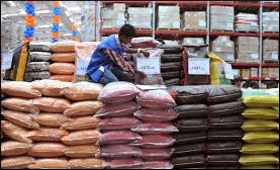|

|
January retail inflation eases to 5.07% on lower food prices
|
|

|
|
| Top Stories |
 |
|
|
|
SME Times News Bureau | 13 Feb, 2018
A slight easing in food prices helped lower India's retail inflation in
the New Year although it remained above the five per cent mark at 5.07
per cent in January compared to 5.21 per cent in December 2017,
according to data released by the Central Statistics Office on Monday.
On
a year-on-year (YoY) basis, the consumer price index (CPI) last month
was at a much higher level than the 3.17 per cent in January 2017.
The consumer food price index (CFPI) in January stood at 4.58 per cent compared to 4.85 per cent in December 2017.
Last
week, the Reserve Bank of India (RBI) kept its key interest rate
unchanged at 6 per cent for the third time in succession at its final
bi-monthly monetary policy review of the fiscal, citing upside risks for
inflation from rising global crude oil prices and other domestic
factors.
The RBI said its decision to keep its repo, or short
term lending rate for commercial banks, unchanged is consistent with the
neutral stance of the central bank aimed at achieving its median
inflation target of 4 per cent.
"We expect headline inflation to
be at 5.1 per cent in the fourth quarter (January-March), including the
impact of HRA (house rent allowance) to central employees, up from the
4.6 per cent in Q3," RBI Governor Urjit Patel told reporters here after
release of the monetary policy review.
However, the fact that the
central bank did not raise the repo rate in the face of hardening
inflation as recommended by one of the six monetary policy committee
(MPC) members is being considered as its attempt to aid in economic
recovery.
Presenting his last full budget earlier this month
before the general elections next year, Finance Minister Arun Jaitley
made a significant announcement of fiscal slippage with implications for
pushing inflation, revising upwards the government's fiscal deficit
target for 2017-18 to 3.5 per cent of the GDP, or the equivalent of Rs
5.95 lakh crore.
The higher target came in place of the 3.2 per cent -- or Rs 5.46 lakh crore -- for the current fiscal announced earlier.
|
|
|
| |
|
|
|
|
|
|
|
|
|
|
|
|
|
|
| |
| Customs Exchange Rates |
| Currency |
Import |
Export |
US Dollar
|
66.20
|
64.50 |
UK Pound
|
87.50
|
84.65 |
Euro
|
78.25
|
75.65 |
| Japanese
Yen |
58.85 |
56.85 |
| As on 13 Aug, 2022 |
|
|
| Daily Poll |
 |
 |
| PM Modi's recent US visit to redefine India-US bilateral relations |
|
|
|
|
|
| Commented Stories |
 |
|
|
|
|
|
| |
|